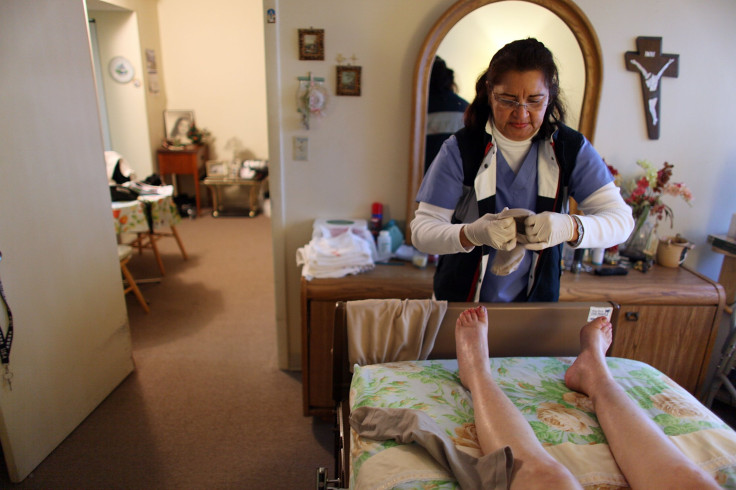Home Care Workers' Lawsuit Alleging Wage Theft Exposes Growing Industry's Troubling Pay Practices

Ann Temple has worked as a home care aide in Washington for more than six years. Five days and 40 hours a week, she attends to her elderly client, preparing breakfast and baths, cleaning the house, scheduling doctors’ appointments and picking up medicine.
Like millions of others who make up one of the nation’s fastest-growing occupations, Temple, who is 60, has to make due with low pay. She earns $13.80 an hour and lives with her daughter and grandson because she can’t afford to rent alone in the city’s famously pricey housing market.
The financial stress is especially frustrating, Temple says, because she knows she’s entitled to more. She says her employer, JD Nursing and Management Services Inc., ignored local mandates to increase the minimum wage, pay overtime and provide paid sick leave. As a result, she says the company owes her thousands of dollars.
“We deserve our money,” Temple says. “It’s not something they’re giving to us. We worked for this.”
Temple is part of a class-action lawsuit filed Tuesday that accuses JD Nursing and four other local home care agencies of widespread wage theft. Supporters say the companies could owe more than $100 million in back pay. It’s the third such lawsuit Washington home care workers have filed since December 2014, putting a dozen different firms on the hook for potential violations.
None of the five firms named in the suit -- Alliance Home Health Care & Equipment Services, Inc., Berhan Home Health Care Agency, Immaculate Health Care Services Inc., Divine Health Care Services Inc. or JD Nursing -- immediately responded to requests for comment.
Wage theft in the home care business isn't unique to the nation's capital. It runs rampant across the industry, says Caitlin Connolly of the left-leaning National Employment Law Project. A 2009 study from NELP and others found nearly 80 percent of home care workers had experienced overtime pay violations; 90 percent had experienced so-called off-the-clock violations, in other words, provided free labor. In part, that’s driven by the nature of the industry.
“The place of work is someone’s house, and it’s often isolating,” says Connolly. “It’s hard to organize and communicate with other workers about a potential violation.” Also, caring for seniors tends to forge emotional ties between workers and clients. While rewarding, the bonds can drive employees to put in extra time, whether or not they’re properly compensated for it. “Bad employers,” she says, exploit that sense of obligation to extract unpaid labor.
There are nearly 2 million home care aides and personal care aides in the United States. As baby boomers retire and people live longer, both jobs are expected to grow by about 50 percent in the next decade, according to the Bureau of Labor Statistics, making them the second- and third-fastest-growing occupations in the country, respectively. The workforce -- overwhelmingly women, a majority of them ethnic minorities and a quarter of them foreign born -- earns around just $20,000 annually.
The industry’s low wages and attractive growth prospects have made it, much like the fast-food sector, a beacon for labor unions seeking a presence in the modern American economy. Labor unions have had some success organizing the industry, and some of the thousands of care aides in Washington are trying to organize with the Service Employees International Union. In April, home care workers joined fast-food employees in high-profile protests for “$15 and a union." But there’s another big reason the suits have flooded Washington -- rather than, say, Texas or South Carolina.
Along with only 15 other states, the District of Columbia extends minimum wage and overtime protections to home care workers, most of whom are exempt from such rules on the federal level. An Obama administration rule was supposed to end the exemption earlier this year, but an industry-backed lawsuit struck it down, sending the measure to an appeals court, where it lingers today. Also, since 2008, Washington has mandated that employers provide paid sick leave to workers.
But Temple -- like others in the lawsuit -- says her employer never informed of her right to paid sick leave. When she got sick, she showed up to work anyway. “I just had to put my mask on and keep going,” she says.
Nor has she received back pay. Washington requires a special “living wage” for employees of city contractors. In January 2014, the city extended that higher pay rate -- then $13.60 an hour -- to home care workers and called on employers to issue a year’s worth of back pay. Temple, though, says she made only $10.50 until last April.
If she had the extra cash, Temple says the first thing she’d do is take care of an overdue gas bill. “It would be a blessing,” she says. “I could breathe again.”
© Copyright IBTimes 2024. All rights reserved.






















